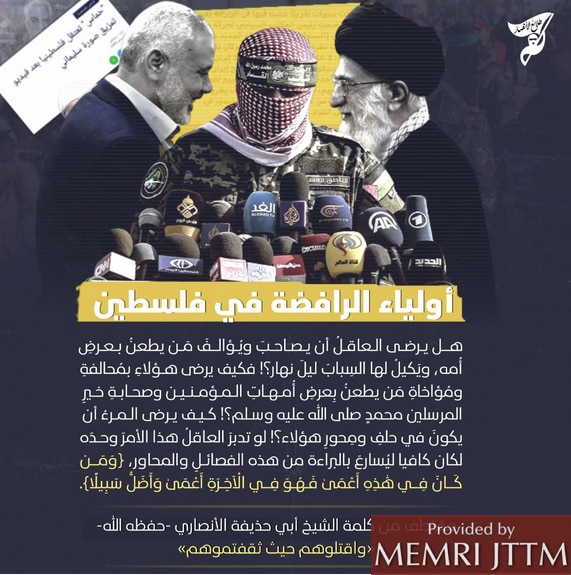The following report is now a complimentary offering from MEMRI's Jihad and Terrorism Threat Monitor (JTTM). For JTTM subscription information, click here.
On January 7, 2024, a pro-Islamic State (ISIS) media outlet published a poster criticizing Hamas for its alliance with Shi'ite Iran. Titled "The Wrong Alliance," the poster presents a photo of senior Hamas official Khaled Mashal embracing Iranian Supreme Leader Ali Khamenei, accompanied by the caption, "Why are Rafidites [pejorative term for Shi'ites] dominating the scene in the Gaza war?"

On January 9, a pro-ISIS media outlet published a poster featuring a quote from a January 4 audio message by ISIS spokesperson Abu Hudhayfah Al-Ansari condemning the formation of alliances with Shi'ites who violate the honor of the "mothers of believers" [wives of the Prophet Muhammad] and the prophet's companions. Asking rhetorically how anyone can form an alliance with "those," the excerpt states: "If a wise man considers this matter alone, it should be enough for him to quickly renounce these factions and axes." The poster displays a photo of Hamas spokesperson Abu 'Ubaydah backgrounded by Hamas political leader Ismail Haniyeh and Ali Khamenei.

On January 14, a pro-ISIS media outlet published a poster titled "Fighting for Homeland and Nationalism," displaying a picture of Ismail Haniyeh and Ali Khamenei standing together. The poster's text stresses that fighting for purposes other than supporting shari'a law is forbidden, and anyone who makes this mistake must be taught to fight for shari'a alone. It concludes: "Fighting for the sake of homeland, nationalism, etc. does not designate the entire religion to Allah."

The full text of this post is available to subscribers.
Please login or register to request subscription information from MEMRI



